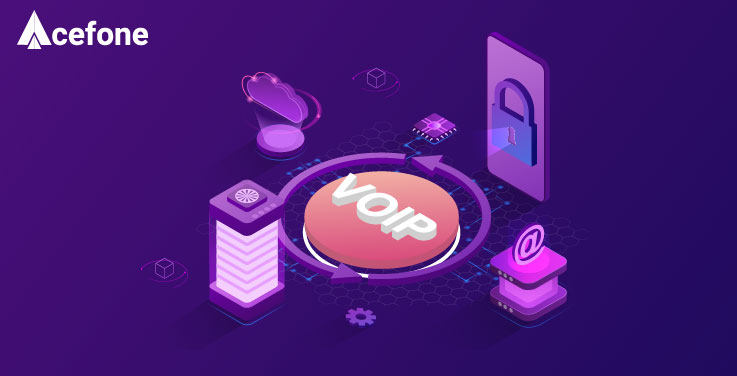Are you still using the regular telephone line to contact your customers?
This needs to stop right away.
2024 is coming to an end and so is traditional PSTN calling.
Switch to VoIP calling today and experience the future of customer communication.
The higher rate of VoIP adoption has resulted in its massive growth. A recent report by Grand View Research states that the global mobile VoIP market is expected to grow at a CAGR of 12.9% from 2024 to 2030.
As it is hosted on the cloud, VoIP doesn’t demand any infrastructure for you to make phone calls. Your representatives can use their smart devices to connect over the Internet and make calls on the go.
Want more?
You can also enjoy countless capabilities like call monitoring, skill-based routing, video conferencing, multichannel interactions, virtual IVR etc. to deliver a wholesome experience.
While several companies are working remotely or have a hybrid work ecosystem, connecting across multiple VoIP phones help you support uninterrupted services from the comfort of your home.
What are VoIP systems?
Let’s begin with understanding the basics of VoIP phone systems.
Voice over Internet Protocol (VoIP) technology enables you to establish calls from any device through the internet. You may conveniently use this communication system instead of the regular telephone lines in your organization.
VoIP phones for business are based on open standards. They can be used to call any phone number without the need for a physically established, analogue telephone connection. Instead of using traditional copper wired phone lines, VoIP technology uses data packets to transmit calls across the Internet.
VoIP based business phones enable you to manage multiple calls on the same phone number or have multiple calls route to a single individual.
To make a VoIP call you may use a Private Branch Exchange (PBX) connected to internal phone extensions with public networks. Additionally, you can also collaborate with a trusted VoIP service provider who can simply plug your IP phone in. You will then be able to use your VoIP business phones to establish reliable connections supported by high-speed connectivity.
How do VoIP systems work?
During VoIP calls, the hosted PBX converts your voice into small data packets, that travel between the VoIP phone used for calling and the VoIP provider in the minimum possible time. On the receiver’s end, these data packets are reassembled and converted back to audio signals which can be heard by the call recipient.
Let’s break down how a VoIP call works:
- Your phone connects to the PBX or the router in your Local Area Network (LAN).
- The VoIP call request is then sent over to your IP provider.
- Your VoIP provider then establishes the connection between the recipient’s and your number by exchanging data packets.
- The VoIP phone on the receiving end then converts these signals into a voice that they can hear.
What are the benefits of using a VoIP business phone?
There are endless benefits of using a VoIP business phone over your traditional phone system. Some of them are:
Cost-effectiveness
A VoIP phone system doesn’t demand additional hardware for connectivity. The upfront investment that goes into setting up or regularly maintaining a VoIP infrastructure is minimal.
On the other hand, traditional phone lines need dedicated wiring and physical devices to make and receive calls. The maintenance of these conventional systems is also time and cost consuming.
Enhanced reliability
When you use a business phone that solely depends on the Internet, the first doubt that may strike your mind is: what if the Internet connectivity is lost? This could happen due to natural calamities or technical hiccups.
Let’s say you can’t use your VoIP business phone due to poor connectivity. Many VoIP service providers offer a call forwarding functionality to redirect incoming calls to other available devices.
Better mobility
In the present-day scenario, everybody is on the move. With VoIP, you need not stay hooked to your work desk to attend to customers. You may answer calls from anywhere across the world through your assigned contact number.
A VoIP phone system has your business covered irrespective of the work location of your employees.
Ease of use
Connecting to conference calls via traditional phone lines may be heavy on your pocket.
Not to forget the costs that go into establishing connections and having the hardware in place. VoIP phones, however, simplify this by letting you hop over calls using the Internet at no additional charges.
Most VoIP systems come with a user dashboard that is very intuitive, like Acefone. It allows users with little to no technical knowledge easily make VoIP based conference calls.
Higher customer efficiency
VoIP systems come with several features like call twinning, agent performance dashboard, virtual IVR, etc. to make the agent’s experience efficient.
You can record customer calls and use these recordings for training purposes. This way new recruits get a glimpse of the actual work ecosystem and challenges they may face before hitting the workspace in real-time.
Furthermore, these recordings help you identify any possible bottleneck or redundant issues that may arise. Also, frequently asked questions can be noted and added to an information repository for references or to facilitate self-service. These actions positively contribute towards better customer efficiency.
Accelerated sales growth
As VoIP systems, with their various features, allow stakeholders to have a better hold on processes, the identification of functional and operational challenges becomes easy.
VoIP phone’s various features allow you to identify and address complex customer needs faster. Functionalities like IVR numbers, skill-based routing, connect customers with urgent and complex needs with the most relevant agent in lesser time.
What are the different types of VoIP systems?
Now that we have an idea about the benefits of VoIP systems, let’s check their types. VoIP systems are broadly of two kinds. These are as follows:
On-premises VoIP systems
As the name suggests, on-premises VoIP systems are those that are maintained within the premises of the workplaces. That is, all the necessary infrastructural and technical equipment is maintained within the premises of the office.
With this comes the need to hire staff who know how to perform these activities. However, when you have an on-premise VoIP system, you can easily add or remove capabilities and features. You may not be dependent on a third party to carry out your operations.
Hosted VoIP systems
Hosted VoIP systems, on the other hand, are provided by VoIP service providers specializing in this area. Which is why choosing the right service provider for your business becomes a vital step in this process of VoIP based communication.
Hosted VoIP systems come with the advantages of freeing you up from the burden of managing everything. You needn’t worry about the technical or infrastructural setup, instead you provide your list of requirements to your service provider and sit back.
Furthermore, the need to maintain a dedicated team for the VoIP systems is also eliminated. All your system upgrades and patch management are completely taken care of by your service provider.
What are the important features of VoIP systems?
With this sneak peek into the broad classification of VoIP systems, let’s check out some important and popular features:
-
Auto-attendant
An auto-attendant is like a virtual assistant. Both these systems can attend calls on behalf of your agents and route them to the right department. This feature helps agents save time on incorrectly routed calls, improving their efficiency and productivity.
-
Call routing
Call routing can help you appropriately direct ad categorize calls based on the customer’s name, query nature, agent availability, and performance.
For example, a customer may come back with a recurring issue, with their history indicating that they may be frustrated. This call should be directed to a supervisor or an experienced agent who can soothe and pacify the caller.
-
Call analytics
Analytics and call monitoring go hand-in-hand, playing an important role in the efficiency of your processes.
With the call analytics feature, you can review your agents’ call performance, identify bottlenecks for complex cases, check the need for additional training, and improve functional and operational performances.
-
Call Forwarding
Unanswered calls may adversely affect your business growth.
For example, if your customer calls your representative in need of urgent help and the agent is not available, this instance may reflect your business in a negative light. The customer may be left feeling disappointed and frustrated, deciding to take their business elsewhere.
Call forwarding helps in such cases. With this feature, your agents can redirect calls to other available agents. For example, they may choose to forward incoming calls to their own other devices or other colleagues who are free to take calls.
Call transfer
The call transfer option is particularly important when your agents want to seek the help of their supervisor or escalate an issue.
An agitated customer may not be ready to wait for a callback from the supervisor. The call transfer option helps them instantaneously push calls to managers and supervisors when there is a dire need for one.
The feature facilitates first call resolution rate and enhances customer satisfaction.
Instant messaging
Customers can be of different types. While some may prefer talking to agents, others may feel comfortable texting. VoIP systems cover all these types of customers alike. The instant messaging option allows customers to reach out to you through text messages too.
-
IVR
The Interactive Voice Response (IVR) is an in-call menu that provides self-service options to customers before connecting with agents. While the IVR enables customers to reach the right agent for an appropriate resolution, it also helps them obtain automated resolutions for simpler queries.
This feature saves time, reduces call queues, and improves customer satisfaction.
Softphone/ WebRTC
The softphone is yet another commendable availability for VoIP callers. While you enjoy the freedom to connect with colleagues and customers over the Internet, you can also benefit from the mobile VoIP app and WebRTC calling to stay connected.
The softphone is compatible with most operating systems and devices. Acefone even offers a chrome extension of the software if you want to avoid downloads.
When should you consider using a VoIP system?
We have learned about the features and benefits you will experience from VoIP systems. Now, let’s understand when you should shift to a VoIP system.
- If your employees work from home
The primary advantage of VoIP systems has been connectivity even when working remotely. So, if you have shifted your employees to a remote working ecosystem or a hybrid environment, you should be considering VoIP systems.
If your business demands your teams to stay on the field while remaining connected and updated, a VoIP system is the right choice for you.
- If you don’t have a big list of analogue must-have phones
Though you may be excited to make the shift to VoIP systems, there may be a few telephone lines, like the fax machine, that you may need to retain.
Identify these communication lines and retrofit them to send digital data over the Internet. Ensure that this list isn’t too big when considering the change to VoIP systems.
- If you need additional features and are looking for better performance
VoIP is the right choice when you are looking to get more from your telephony system.
The technology comes with several features that have been discussed above. If you are looking to up your business communication performance, Acefone is your one stop solution platform.
What should you be considering before installing VoIP systems?
Though VoIP systems come with a plethora of benefits, stakes may as well be high for businesses.
Here are a few things you should consider before the installation of VoIP systems:
Finalize your budget and cost of installation
Every service provider offers different types of packages. While a few may provide their equipment, others may leave it to you to choose one from a retailer.
It is best to analyze expenses like:
- Monthly payment
- Additional or hidden charges like installation fees
- Paid vs Free Product Training
- Type of equipment/ software provided
- Features offered in specific plans
- Plan customizability
- Post sales operations
Delve deeper into the migration process
The typical migration process will include software installation, sourcing of phones, number porting, connecting the phones, and porting the phones.
Though this migration process should be done with minimal or no downtime, it is best to understand and learn the intricacies of the migration process from your service provider.
Check for the final list of features
VoIP systems come with several communication and performance features. Consider reviewing them and choosing the ones you will need for your business.
At Acefone, we let you choose the features you need the most for your business.
Ensure a good network bandwidth
A strong network connection and bandwidth is the base for a seamlessly performing VoIP system. Check if your existing network connectivity will suffice or if you will need to upgrade your bandwidth and Internet connection.
Some providers even offer HD calls on low bandwidth. Look for providers that offer better communication regardless of your Internet speed.
Revisit security features
With cyber threats and attacks on the rise, it is pivotal that your VoIP phone system is upgraded and patched regularly. You should discuss with your service provider about compliance-related issues and ensure that your system is protected from malicious activity.
Acefone ensures that you face no legal allegations and are distant from any service interruptions. Our products abide by all concerned government regulations and keep our database secure and updated.
Check for alternate power plans
Make sure that your VoIP service provider has an alternate power plan in place. This will help in the case of power outages. They may provide you with a mobile app or any other alternate source of electricity to have your system up and going even during a power shut down.
To sum it up
VoIP systems have become a cardinal element for businesses to stay competitive. This complete guide elaborates on several aspects that will help you gain a better understanding of VoIP systems and justify why you should be choosing them.
If you are looking to get a VoIP-based solution for your business, you can get in touch with our experts. Drop us an email at [email protected] and they will get back to you ASAP.
You can also chat with them by clicking here.














